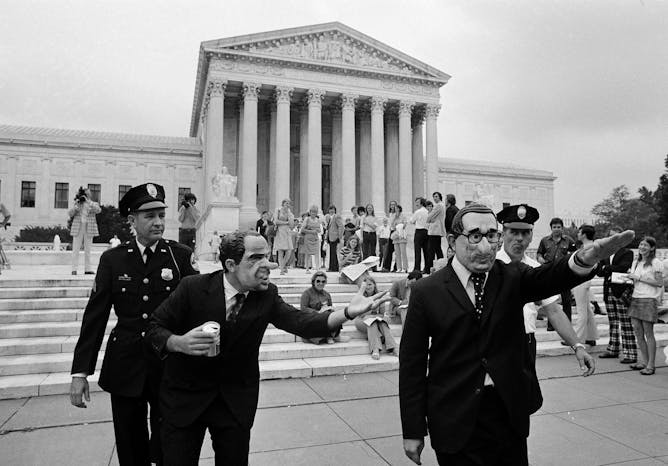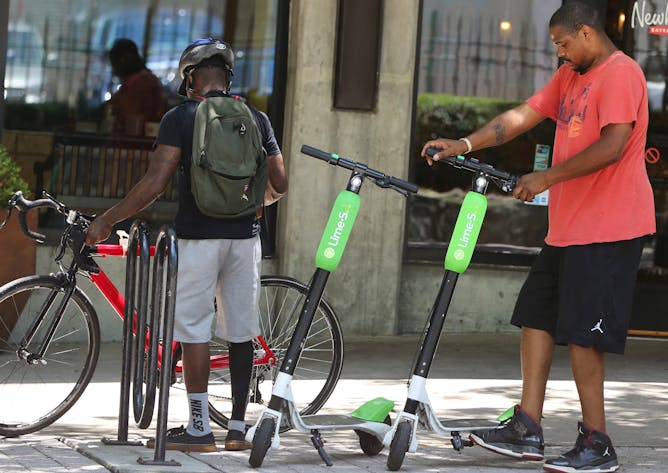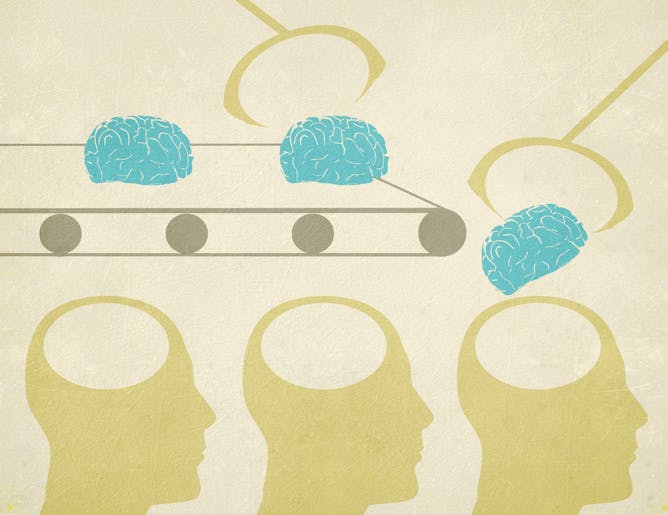|
|
|
Editor's note
|
|
Russian election meddling may be shaking Americans’ faith in government. According to one recent poll, just 16 percent of people truly think their vote matters. But skepticism about U.S. democracy has been high since Nixon’s criminal misbehavior in the 1970s. Analyzing survey data from 1952 to 2016, political scientist Ian Anson of the University of Maryland, Baltimore County found a deep, lasting and surprisingly bipartisan
discontent with the American political system.
Have you ridden an electric scooter yet? Or narrowly escaped a collision with one? Electric scooters could be coming to a city near you, if they haven’t arrived already. But these new rideables come with a host of risks, says Jim Sallis, a public health scholar from the University of California, San Diego. “In a collision, the pedestrian will always be the loser,” he writes.
Forty years ago, Rebecca Moore’s two sisters were among those who planned the mass deaths in Jonestown, Guyana. They were members of the Peoples Temple, a group many have derided as a cult comprised of brainwashed followers under the control of their charismatic leader, Jim Jones. But Moore, a religious studies scholar, rejects this characterization, arguing that it absolves them of their actions and prevents us from understanding why
people are drawn to fringe religious groups in the first place.
|
Catesby Holmes
Global Affairs Editor
|

|
|
Top stories
|

Historically, the high-water mark for American dissatisfaction with government was the 1970s — the era of Vietnam, Nixon and Watergate.
AP Photo/John Duricka
Ian Anson, University of Maryland, Baltimore County
Russian meddling has shaken Americans' faith in democracy. But public discontent after a scandal is hardly new. Trust in government began to erode under Nixon, and it's mostly worsened since then.
|

A man in downtown Atlanta with an electric scooter on June 26, 2018.
Brinley Hineman/ AP Photo
Jim Sallis, University of California San Diego
Electric rideables are making life less comfortable and more dangerous for pedestrians. Here's how makers of rideables could help make cities safer for everybody.
|

We’ll say someone’s brainwashed only when we disagree with their beliefs or actions.
lolloj/Shutterstock.com
Rebecca Moore, San Diego State University
Forty years ago, Rebecca Moore's two sisters helped plan the Jonestown massacre. But she refuses to say they were brainwashed, arguing that it prevents us from truly understanding their behavior.
|
Politics + Society
|
-
Thomas Bateman, University of Virginia; Mike Crant, University of Notre Dame
Research on proactive behavior shows it can help people perform better at their jobs. A failure to do so can be even more consequential.
-
Jacob Neiheisel, University at Buffalo, The State University of New York
The president won't be removed from office until Republicans in the House decide to support the idea – or the midterms hand the Democrats more seats.
-
Eduardo Capulong, The University of Montana
This tradition is so strong in the US that all lawyers are encouraged to volunteer at least 50 hours of pro bono service per year.
-
Jordanna Bailkin, University of Washington
Camps of the 20th century were focused on resettlement. Today, the focus is on confining movement and deportation. What changed?
|
|
Science + Technology
|
-
Mark Hempstead, Tufts University
As the microchip industry celebrates the 50th anniversary of chipmaker Intel's founding, engineers and researchers call for a complete rethinking of computer architecture.
-
Gaetan Burgio, Australian National University
A new study found the Cas9 gene editing scissors don't stop cutting after we tell them to.
|
|
Trending on site
|
-
Sara Jensen, Carthage College
In this professor's class, there are no calculators. Instead, students learn advanced math by talking, drawing pictures, playing with beach balls – and knitting.
-
Doug Cowen, Pennsylvania State University; Azadeh Keivani, Columbia University; Derek Fox, Pennsylvania State University
A detector buried under more than a mile of ice in Antarctica has detected a high-energy subatomic neutrino and traced it to its origin, a blazar – a gargantuan black hole more than a billion times more massive than the sun.
-
Jason Dedrick, Syracuse University; Greg Linden, University of California, Berkeley; Kenneth L. Kraemer, University of California, Irvine
The president launched a trade war largely on the premise of a massive trade deficit with China. A closer look at the iPhone shows why he's wrong.
|
|
|
|
| |
| |
|
|
|
|
|
|
|